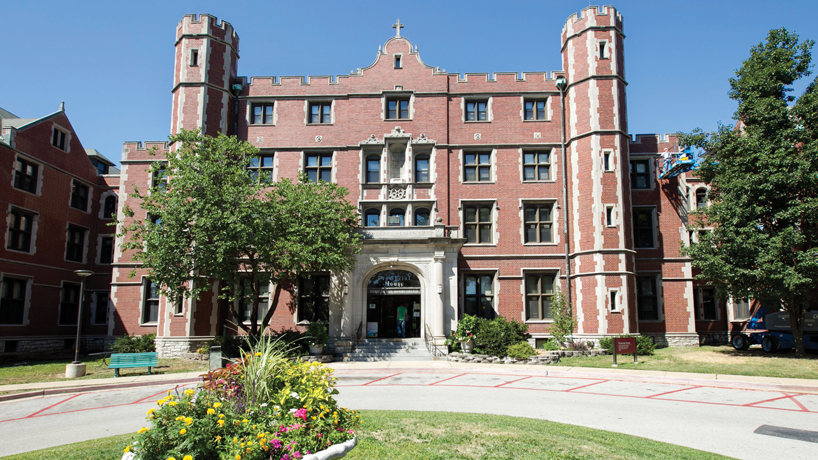
Provincial House on South Campus is the current home of the Pierre Laclede Honors College. The college was originally located in Normandie Hall. (Photo by August Jennewein)
The 2014-15 academic year marks the 25th anniversary of the University of Missouri–St. Louis’ Pierre Laclede Honors College, a small college with a liberal arts atmosphere nestled into a large public university campus. To mark the occasion, UMSL Magazine caught up with the college’s two deans, the chancellor who hired them, and the college’s first writing program director. But the college’s story actually begins in 1978 with its predecessor, the Sophomore Honors Program.
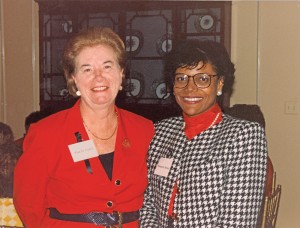
Blanche Touhill (left) and Marguerite Ross Barnett worked to expand the original honors program into the Pierre Laclede Honors College. (University Archives photo)
BLANCHE TOUHILL [UMSL chancellor, 1990-2002]: The man who ran that program was a fellow named Steve Hause. He was a member of the history department faculty. He had a lounge in Lucas Hall that was designated as the honors program lounge. The students and faculty could sit in there, chat and meet. They just used the regular classrooms. But it was a different kind of setting than the large lecture hall or the course that had 50 students in it. These classes were small. Maybe 20 students at the most. Later, Marguerite Ross Barnett (UMSL chancellor 1986-1990) came along, and she wanted the curriculum for all four years. It was going to have a dean. It would have faculty. And it would be a college. When I took over as chancellor, John Onuska was the director. It was still an honors program but it was moving to be an honors college. I was looking around the neighborhood for space for the college. Our goal was to get the college from 68 students to 300. I went to the Incarnate Word nuns, who had a building. It had a parquet floor, small seminar rooms, offices, a chapel, which we could use for a convocation hall, recreation space in the basement, a little cafeteria and 10 bedrooms upstairs on one floor and 10 bedrooms on another. The campus had been trying to get a dorm for years. We purchased the building, which became the honors college campus.
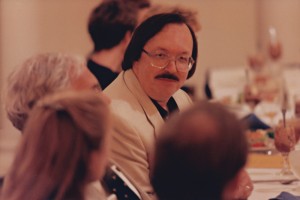
Fred Fausz, associate professor of history at UMSL, was the first dean of the Pierre Laclede Honors College. (Photo courtesy of Fred Fausz)
FRED FAUSZ [associate professor of history at UMSL, first dean of the honors college]: For most of my tenure, August 1991 to August 1996, I was the only full-time employee. The honors college grew from 45 to 260 students in my five years. I began and ended my tenure in the original PLHC building – the former Incarnate Word convent. That was also UMSL’s first residence hall. All honors classes were held in that charming old building, and on the floors above my office were dorm rooms and the nuns’ quarters. That was probably the most quiet residence hall floor of any U.S. college! The sisters remained there the entire 1991-92 academic year, cooked hot lunches that sold for $2.50 and even conducted the last funeral for one of their number in what later became our convocation hall – while classes were in session.
TOUHILL: We were trying to create a small college inside a large urban university to provide a special kind of education for a particular kind of student.
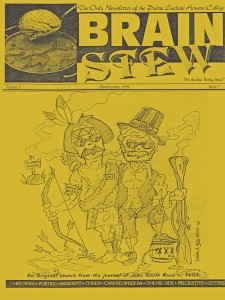
A past cover of the honors college publication “Brain Stew” depicts Fred Fausz (left), the first dean of the honors college, and Dennis Bohnenkamp, the associate dean at the time.
BOB BLISS [current honors college dean]: Fred Fausz and Dennis Bohnenkamp did so much to create collegiality, a sense of belonging among the students. That has been ever so important.
FAUSZ: Denny Bohnenkamp was my two-thirds-time associate dean, and we had student workers in the office and giving tours to families. The two of us read every application, all the writing samples and conducted every interview with all applicants.
BLISS: When (Interim Dean) Bohnenkamp showed me into my office on my first day, my chair completely collapsed – in a heap – when I sat down, with me sprawling on the floor. After that, deanly dignity could not be an issue.
TOUHILL: I hired Bob Bliss, and I said “I want 600 honors students.” In time, we bought the Daughters of Charity property. I asked Bob if he wanted to move the college from Incarnate Word. He had to because to get to 600 students, he needed more classrooms. So we moved him over (to what is now Provincial House), and he did it. He got to 600 students.
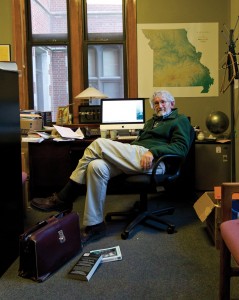
Bob Bliss, dean of the honors college since 1997, will step down in August and become a faculty member in the Department of History. (Photo by August Jennewein)
BLISS: Since I started as dean in 1997, we have gone from 250 to 600 students, from three faculty and staff members to 10, and from approximately 35 seminars per year to 90-plus. Our 600 students today are as well qualified as those 250 were in 1997, but today’s students encounter a much fuller honors program, including an in-house writing program.
NANCY GLEASON [first director of the writing program, associate dean emeritus]: High-achieving students are attracted to the college, the kind of students who want to be involved, want a “college experience” and want to be academically challenged.
BLISS: Every qualified applicant is interviewed by a faculty member; every accepted student has a faculty adviser. And thanks partly to having full-time faculty, thanks partly to having Nancy Gleason among them, we have our own in-house writing program, which helps students negotiate their academic career. Almost all honors seminars are put on by the honors college, paid for by the honors college, and – although typically open to main campus students and often crosslisted with major programs – appropriate for an “honors” education. It’s also unusual to have a fully-fledged honors program for transfer students, which we have had here since 1989. Indeed, for the first 10 years, the honors college was the main source for transfer scholarships.
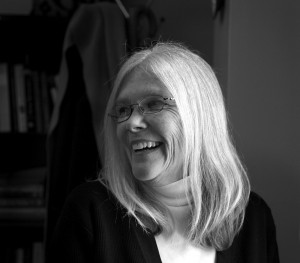
Nancy Gleason is the first director of the honors college writing program and associate dean emeritus. (Photo by August Jennewein)
GLEASON: As a graduate of UMSL, I wish that they would have had an honors college back in those days. I like offering students a full experience, and I love getting to know the students really well. It is gratifying. I believe we help students a lot. I believe in the honors college, and I believe in UMSL.
BLISS: When I retire as dean (in August), I plan to teach. My teaching responsibility at UMSL will be in history, but I will continue to discharge part of that responsibility by offering seminars in the honors college. Otherwise, I plan to leave the honors college entirely to those improvements thought most desirable by the new dean and by the honors faculty. Improvements will be needed, and improvements will come.
This story was originally published in the spring 2015 issue of UMSL Magazine. In addition to UMSL and honors college administrators, UMSL Magazine interviewed several alumni about their memories of the college and its precursor, the Sophomore Honors Program. The following includes a few excerpts:
“I participated in sophomore honors, the grandfather of the honors college. UMSL, in those years, was a commuter campus. The student center was not much more than a big room. It is a much different place now. I was in several large freshman lecture classes. Even those smaller classes had at least 40 people in them. The Sophomore Honors Program was billed as a more challenging academic experience with smaller class sizes. The classes were academically rigorous and small, and the professors were passionate about their subjects and us. I think what’s critical to the honors college’s success is professors taking a personal interest in their students and sharing, if for ever a brief moment, a subject that they – the students – might never have thought about ever delving into. The professors expanded their horizons and showed the students a bit of the world that they may not even have imagined existed.”
–Jeff Bunten, BSBA 1980
“Probably my favorite honors college-related memory was a class taught by Fred Fausz and Dennis Bohnenkamp. They did a seminar on the 1960s. It was mostly a lot of reading, but more importantly was the opportunity to listen to Fred and Dennis recount their own goofy experiences. You kind of have to know Fred and Dennis personally, but they were basically college hippies during the 1960s. It was just a frickin’ amazing seminar to experience. Registration for that course always seemed to close within 12 hours of being posted because every student in the college wanted to take it!”
–David Roither, BA philosophy and BA political science 1996
“I miss the people. I met some of my best friends – and husband – at the honors college, and I still keep in touch with many of them. The honors college was literally my home as a freshman and sophomore. I lived in the building, and I had several of the same honors professors for multiple classes so I built a relationship with them. Bob (Bliss) and Nancy (Gleason) were always looking out for all of us, so it was nice to have a second set of parents while we were away from home. The honors college is a tight-knit community that is hard to find anywhere else.”
–Holly Pope, BA biology and BS biochemistry and biotechnology 2008















